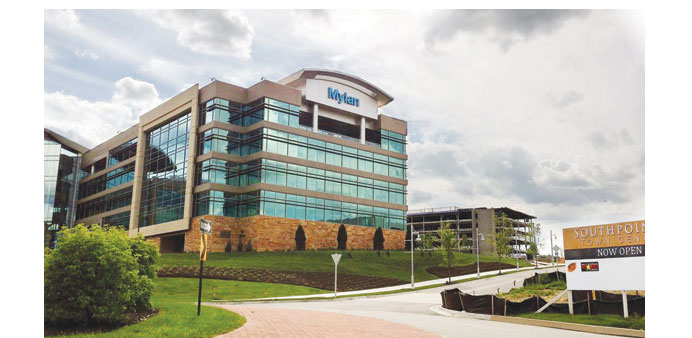Mylan’s $26bn hostile takeover bid for Perrigo was rebuffed by that company’s investors on November 13, foiling its attempt to bolster its over-the-counter business.
Bloomberg
London
Mylan, bruised by its acrimonious and ultimately unsuccessful bid to buy Perrigo Co, is likely to find itself now competing with the drug maker for other assets.
Both companies may look to buy Impax Laboratories, a generic-drug maker from Hayward, California; Stada Arzneimittel, a German maker of off-patent medicines; or Taro Pharmaceutical Industries of Israel, said Elizabeth Krutoholow, a Bloomberg Intelligence analyst in New York. All of them have over-the-counter products, making them attractive targets.
Mylan’s $26bn hostile takeover bid for Perrigo was rebuffed by that company’s investors on November 13, foiling its attempt to bolster its over-the-counter business. Like Pfizer, which this week secured a deal with Allergan Plc after last year’s unsuccessful bid to buy AstraZeneca, it may yet find a willing partner. But after public rebuttals from both Perrigo and Meda, the time isn’t right to seek shareholder support for another risky transaction.
“They don’t have a lot of confidence from investors right now,” Krutoholow said. “They can’t afford to lose on their next bid.”
Mylan and Stada declined to comment, while Impax and Taro didn’t return calls or e-mails.
Perrigo chief executive officer Joseph Papa, having successfully rebuffed Mylan, said earlier this month that his firm will be looking at “consumer-facing” assets. Most of Perrigo’s sales come from that segment of the market, which includes cough and cold remedies, allergy medicine and other products that can be bought without a prescription.
Mylan, which had sought to add such over-the-counter products to its generics business by buying Perrigo, may look instead for assets left homeless in the aftermath of its rivals’ more successful deals.
Allergan’s proposed sale of its generic-drugs unit to Teva Pharmaceutical Industries may yield such an opportunity for Mylan, according to Nexthera Capital’s chief investment officer Ori Hershkovitz. That transaction will require the shedding of some assets to get past antitrust hurdles, he said. Mylan had rebuffed a $40.1bn takeover offer from Teva earlier this year.
Perrigo spokesman Art Shannon declined to comment beyond Papa’s earlier statement. Teva declined to comment. Allergan didn’t reply to an e-mail.
“For Mylan, it’s stick to what you know,” Hershkovitz said by phone from New York. “That means specialty pharma assets and low-innovation products with a tilt toward generics.”
It could also mean Sanofi’s European generics business, which France’s largest drug maker has signaled it may consider selling, according to Hershkovitz. Sanofi declined to comment yesterday.
The generic-drug maker, based in the Netherlands and run from Canonsburg, Pennsylvania, may borrow a page from Valeant Pharmaceuticals International’s playbook and go after low-hanging fruit, according to Krutoholow. After failing to buy Allergan last year, Valeant chose to go after smaller targets such as Salix Pharmaceuticals, a maker of medicines for gastrointestinal disorders.
Pfizer’s $160bn deal with Allergan may also present an opportunity for Mylan down the road, said Ali Al-Bazergan, a deals analyst at Datamonitor Healthcare in London.
Pfizer could offload its generics business as part of an expected plan to split into two companies, with one focused on new drug development and the other on selling older medications, according to Al-Bazergan. Pfizer said on Monday that a decision on the split would come by the end of 2018, three years away.
In the near term, the competition between Perrigo and Mylan — as well as the recent wave of consolidation — means remaining assets are now scarcer for both companies, and will force them to offer bigger premiums, Al-Bazergan said.

